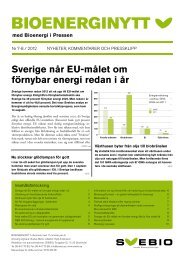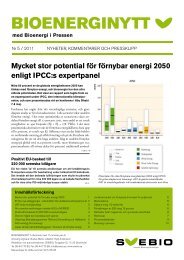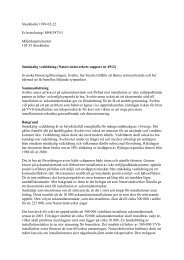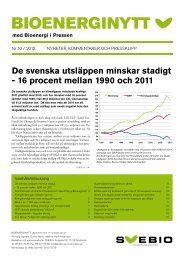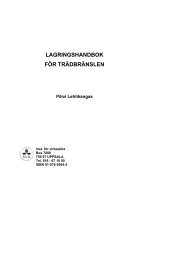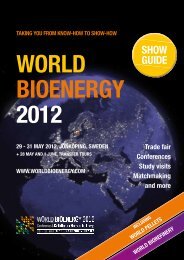Proceedings World Bioenergy 2010
Proceedings World Bioenergy 2010
Proceedings World Bioenergy 2010
You also want an ePaper? Increase the reach of your titles
YUMPU automatically turns print PDFs into web optimized ePapers that Google loves.
consortiums of people) do not have as extensive role as<br />
they do in Scotland and Northern Ireland. Municipalities<br />
are local administrative units and they even have a right<br />
to collect taxes. They have officials and also politically<br />
chosen council and municipal executive board.<br />
Municipalities are mainly administrative organs but they<br />
also do some financing. They can also be customers.<br />
A special feature in Finland is also the existence of<br />
regional development companies. These are independent<br />
bodies financed by various municipalities. Their target<br />
groups are both starting and existing companies in the<br />
region. They do not give any direct funding to the<br />
enterprises but they are advising them and constructing<br />
networks for them. The advisory service is mostly free<br />
for starting enterprises. Existing enterprises will be<br />
provided with valuable advisory services in return for<br />
network fees.<br />
There are various interest groups in the regions. The<br />
role of the interest group like a lobbying group appears to<br />
be very important in every country. They have a strong<br />
influence on decision making at all levels.<br />
Influencing factors outside the four main bodies can<br />
be identified as media, values, legislation, public opinion,<br />
research evidence, global situation and not least the<br />
culture.<br />
3 BARRIERS AND NEED OF SUPPORT<br />
EXPERIENCED BY ENERGY OPERATORS IN<br />
SMALL COMMUNITIES<br />
Diverse energy operators in Northern Periphery area<br />
(Finland, Sweden, Faroe Islands, Iceland, Scotland and<br />
Northern Ireland) were interviewed. The interviews took<br />
place after the operator had made a fairly big investment<br />
in renewable energy systems. Part of the questions<br />
covered experienced barriers (Table I) and some of them<br />
covered various support needs (Table II).<br />
Table I: Barriers experienced by energy operators<br />
Faroe<br />
Islands<br />
Finland<br />
Iceland<br />
Northern<br />
Ireland<br />
Scotland<br />
Sweden<br />
Level of commitment<br />
Globalized financial policy<br />
Knowledge on legal and contractual<br />
questions<br />
Attitudes of some of the authorities and<br />
advisory organisations<br />
Access to best practice examples<br />
Lack of similar cases in grant decisions<br />
Fluctuating level on subsidies<br />
Dependence on national policy (feed-in<br />
tariffs etc.)<br />
Piloting the technology<br />
No advisory organisations existing<br />
Cheaper ways to produce energy exists<br />
(geothermal, hydropower)<br />
Funding application bureaucracy<br />
Grant money payment afterwards<br />
No flexibility in financing<br />
Lack of renewable energy awareness<br />
amongst staff members<br />
Attitudinal approach, amount of ambition<br />
Access to best practice examples for, and<br />
knowledge of funding programmes in small<br />
and very small communities and villages.<br />
The remarkable barriers (Table I) in the researched<br />
cases were lack of know-how, attitudes with advisory<br />
organizations and authorities and amount of bureaucracy<br />
in all stages before and during the investments. In some<br />
cases the investors had to operate as pioneers. Last but<br />
not least, difficulties in financing were experienced as<br />
significant barriers.<br />
Table II: Need of support experienced by energy<br />
operators<br />
Faroe Islands Updated advisory services (legal and<br />
contractual questions)<br />
Finland Training in technology maintenance<br />
Centralized advisory services<br />
Holistic and objective advisory on<br />
investment and technologies<br />
Iceland Lack of development context for<br />
bioenergy<br />
Northern<br />
Ireland<br />
Holistic and objective advisory on<br />
investment and technologies<br />
Training in technologies<br />
Scotland Real life experiences of advisors<br />
(legislation, regulations)<br />
Sweden Increased proactive advisory services<br />
aimed at small and very small<br />
communities and villages.<br />
The operators would have needed the support of<br />
centralized and comprehensive advisory services (an<br />
advisory organization which understand the operational<br />
environment as a whole) (Table II). Thus operators<br />
needed more objectivity and independency from advisory<br />
organizations. There were also lack of skills and knowhow,<br />
so training needs were obvious.<br />
4 FACTORS IN DECISION-MAKING IN FINNISH<br />
MUNICIPALITIES<br />
Savikko [1] has found in her research some<br />
significant barriers and drivers in policymaking around<br />
municipalities in Finland. The research was carried out<br />
through an internet questionnaire in two stages among the<br />
municipalities of Finland.<br />
An interesting finding was the gap between strategic<br />
and operative actions in municipalities’ climate policy.<br />
This gab can form a significant barrier for decision<br />
making. It can be explained by economical situation in<br />
municipalities, old customary ways of action and the lack<br />
of time. The public discussion in media on biofuels was<br />
not a barrier.<br />
The results also indicate several drivers for municipal<br />
decision-making, such as municipal energy efficiency<br />
agreements or energy programmes. Those help<br />
municipalities in renovating their energy systems into<br />
renewables. Also the attitudes of municipal leaders and<br />
public discussion can be significant drivers.<br />
Preliminary results from a survey responded by<br />
decision-makers in North Karelia, Finland, in 2009<br />
supported the findings of Savikko’s research [1]. The<br />
decision-makers (participants of a seminar) were among<br />
other issues asked to point out the three most significant<br />
factors which would affect the decision-making in energy<br />
world bioenergy <strong>2010</strong><br />
57




